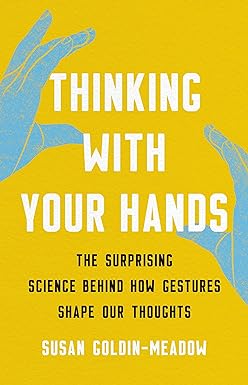
Susan Goldin-Meadow, a professor at the University of Chicago and author of “Thinking with Your Hands: The Surprising Science Behind How Gestures Shape Our Thoughts,” has studied gestures’ role in communication for 47 years. She points out how gestures are vital for conveying information and understanding. Susan discusses how leaders can use gestures to gauge message comprehension when explaining tasks or concepts. She suggests that asking others to explain while observing their gestures provides insights into their comprehension. Susan explores various gestures and their meanings in business and academics. She also touches on the differences between sign and spoken language, gesture use in video communication, and cultural differences in gesture interpretation.
Key Takeaways
[03:17] Susan Goldin-Meadow, a professor at the University of Chicago and author of “Thinking with Your Hands: The Surprising Science Behind How Gestures Shape Our Thoughts.” explores the fascinating role of gestures in communication. Susan talks about a research that shows that even blind individuals use gestures when they speak, revealing the inherent connection between language and gestures. Susan discusses the power of silent gestures in bridging language barriers when communicating in foreign countries.
[08:13] Susan reveals how gestures can uncover the truth, even when words don’t match. She advises leaders to be cautious about their gestures during sensitive conversations. She explains how to assess understanding, asking others to explain in their own words, watching for alignment between speech and gestures, which can indicate comprehension.
[15:49] Susan explores how gestures are a key part of learning, even in unexpected contexts like explaining math problems. Children often gesture when asked to explain, revealing hidden thoughts. Susan also discusses individual differences in gesturing and the surprising case of a young woman born without arms who still felt like she was gesturing, highlighting the intrinsic nature of gestures in communication.
[19:06] Jan asked about how unique gestures and hand signals are used in professional settings, like the military. Susan explains that professionals in various fields often develop specific gestures to convey meanings within their communities. She also mentions the role of engagement and enthusiasm in using gestures to complement speech. Additionally, Susan talks about the importance of physical touch and nonverbal signals in the workplace.
[24:40] Susan explores the power of multimodal learning, where utilizing multiple ways of learning and communicating can be highly effective. She discusses how incorporating gestures and tactile elements can enhance comprehension and retention, making us better communicators and learners. Susan emphasizes that gesture goes beyond just being part of multimodal learning; it exploits it, providing a unique way to convey information.
[27:02] Susan discusses the importance of hands-on training, effective communication, and gestures in the modern workplace. She explores how incorporating gestures and movements into training can enhance learning and improve communication. She also touches on the challenges of remote communication and making gestures visible on online platforms. Susan shares insights into the cultural significance of gestures and why it’s essential to be mindful of different meanings across regions.
[31:51] Jim shared insights from a previous guest, Jim Thompson, who discussed the impact of adding gestures when acknowledging mistakes in youth sports. Susan also touches on the significance of handshakes in sealing agreements and the universality of such gestures in different cultures. Susan hints at her ongoing research in brain imaging and the curiosity to understand the neural processes underlying gestures in communication. Susan challenges listeners to overcome any hesitation and recognize the value of gestures in conveying and understanding messages. She also encourages everyone to be more aware of how their gestures influence others and to consciously observe the gestures of those they interact with.
[36:01] Closing quote: And remember, to communicate through Silence is a link between the thoughts of man. — Marcel Marceau
The Leadership Podcast is sponsored by W.S. Darley & Company.
Founded in 1908, Darley remains a family owned and operated business, providing the highest quality equipment solutions to our country’s warfighters and firefighters.
Learn more at darley.com and darleydefense.com
Quotable Quotes
"Language on its own may not be capable of expressing the full range of human thought." Share on X "Talking and gesturing are one phenomenon. They're very integrated, and you don't need to be taught." Share on X "What we're doing with our hands is we're putting ideas out in space." Share on X "We can put our ideas out there, literally out there, and it's in sync with our words." Share on X "Gestures seem to have a special hold on the truth." Share on X "Often the truth comes out in their hands." Share on X "Be careful of your gestures if you really don't want something to be said… people read them. They don't even know they're reading them, but they do hear them." Share on X "It is very clear they're not getting it when your gestures and your speech aren't saying the same thing." Share on X "When you ask people to explain things, they tend to gesture quite a lot." Share on X "If we can get someone to learn something by having them operate multiple modalities, perhaps we can be better communicators." Share on X "There's lots of evidence that multimodal communication or multimodal learning is better than unimodal." Share on X "What gesture is doing here is exploiting multimodal." Share on X "Remembering, retaining, and generalizing to a new context, you're better off having done the gesture than the actions on the objects." Share on X "I'm into face-to-face communication. It's what I love, actually. And for teaching as well, I think it's important." Share on X "I like to make sure the gestures are visible." Share on X "I think the biggest challenge is using your hands well and not being afraid to." Share on X "Understanding how your gestures are having an impact on other people and trying to read other people's gestures could be helpful." Share on X
Here are the books mentioned in this episode
Resources Mentioned
- The Leadership Podcast | theleadershippodcast.com
- Sponsored by | www.darley.com
- Rafti Advisors. LLC | www.raftiadvisors.com
- Self-Reliant Leadership. LLC | selfreliantleadership.com
- Susan Goldin Meadow LinkedIn Susan Goldin Meadow
- Susan Goldin Meadow Website | voices.uchicago.edu/goldinmeadowlab





Recent Comments